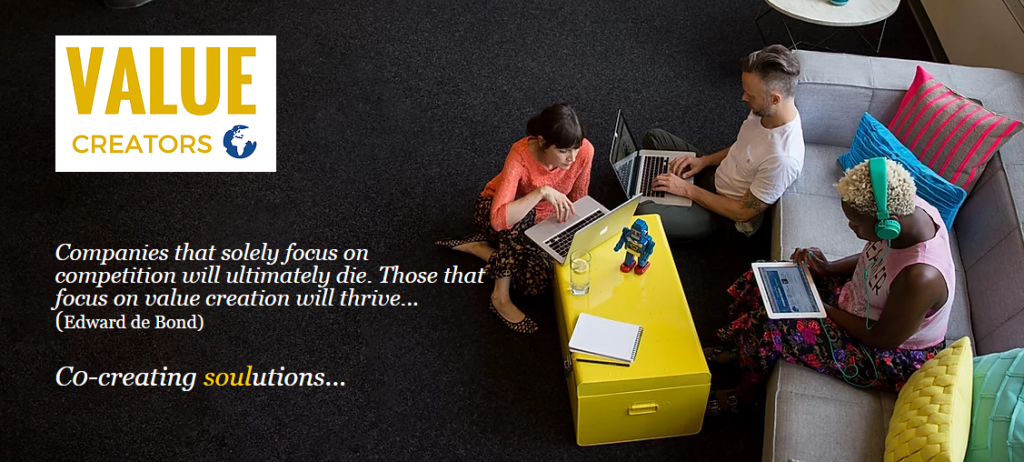Esta web utiliza cookies para que podamos ofrecerte la mejor experiencia de usuario posible. La información de las cookies se almacena en tu navegador y realiza funciones tales como reconocerte cuando vuelves a nuestra web o ayudar a nuestro equipo a comprender qué secciones de la web encuentras más interesantes y útiles.
Value Creators, transformative learning and transdisciplinary approach to SDGs
Description
Institution
Organizations/areas of the university involved
Windesheim Honours College/ Global Project and Change Management/ Sustainability/ Climate adaptation/ Human rights/ New forms of Economy
Country
The Netherlands
Value Creators is an innovative educational concept (30 EC-1 Semester) co-developed by students, lecturers, and the professional community of the Windesheim Honours College (www.windesheimhonourscollege.nl) in Zwolle, the Netherlands. We developed a framework that could allow our students to experiment with their roles as change agents, addressing complex issues, and understanding the context of uncertainty. The SDG agenda provides us with the framework to contextualize complex issues in the form of global challenges. Our students are introduced to the SDG agenda and also the Earth Charter (as a values approach to sustainability) from year 1. Since Value Creators takes place in year 3 and 4 of the curriculum, we took the opportunity to go more in-depth with the SDG agenda, by asking the students to describe the complex questions they were addressing through connections with the SDGs indicators and targets. Making these connections, our students understand the complexity and interconnectedness of the global challenges. Our networks provide our students with complex questions they are dealing with. Students also bring questions from their own networks. At the beginning of the semester, they start mapping the relation of these issues with the SDGs. Students will approach the same issue from different disciplines. We do not offer lessons anymore, and we invite students to move from knowledge as a goal to knowledge as a tool. Therefore, they follow online courses from the SDG Academy, gaining the knowledge they need around the topic they are working on. Next to this, we offer different workshops in Theory U, Theory of Change (Impact Management) and Networks mapping, Systems Thinking, and Uncertainty. Inspired by Design Thinking we have developed our own model: the 4E-model to lead them through the process of creating societal value in 4 phases: Explore, Engage, Elaborate, and Evaluate (https://www.valuecreators-whc.com/e-model-for-change). This model is not only a tool for the students to navigate through complexity and create societal value, but is also the framework that organizes the learning journey during the semester. Value Creators is now part of our year 3 and 4 curriculum. It is a mandatory journey for our students and students from other programs can follow the Value Creators semester as a minor or elective.
Results and impact measured or expected
The Value Creators semester (30 European Credits) was designed to offer students the opportunity to experiment with their roles as change agents dealing with complex issues (linked to the SDG agenda) and in the context of uncertainty. The challenge was to set an organic educational environment that made possible the transition from knowledge as a goal to knowledge as a tool for students and teachers. Students have taken ownership of their learning journey by also being responsible for assessing their own growth at a personal and professional level. Lectures became facilitators guiding the transformational process of students. Working with professional networks has given students the opportunity to approach the SDG agenda in a transdisciplinary way. The main impact has been that students can focus on the process of learning and create meaning and purpose. The impact is continuously measured with coaching sessions, plenary discussions, generative dialogues, and feedback from students and networks.
Connection with the SDG framework
The Sustainable Development Goals agenda is the point of departure for this educational initiative. Students need to link the complex questions they are addressing to the SDG framework. Also they need to gain knowledge in SDGs in general and then specifically in those that are linked to the topics and complex issues they are addressing. They also need to map the dimension of the SDGs they work with, by understanding them at global level but also translating the challenge at local level in the community they are working with. It is important that the students understand the complexity of the agenda and also its limitations. Sometimes targets and indicators are limiting or contradictory. We want our students to be critical thinkers and therefore also maintain a critical attitude towards the agenda and what can be improved and even improvised. We teach for sustainability and not about sustainability.
Barriers and follow up
Most of the barriers to implement flexible and innovative forms of education are usually coming from the institutional level. Universities are still ruled by bureaucracy and limiting regulations that sometimes impede to catch up with the speed of action that the society requires outside the walls of the campus. We are trying to break or twist some of those rules to allow our students to keep learning and acting also beyond the restrictions of time and space. Incorporating MOOCs and technology, is allowing us to break those barriers. Also we need to change the focus of students on final grades towards more focus on the learning process itself and understand that learning does not start and7or finish once you have a university diploma, it is a life long journey. Our next step is to open Value Creators cells in other universities in the Netherlands and in Europe to increase interaction and interdisciplinarity.
Education 4 SDG funciona gracias a WordPress

